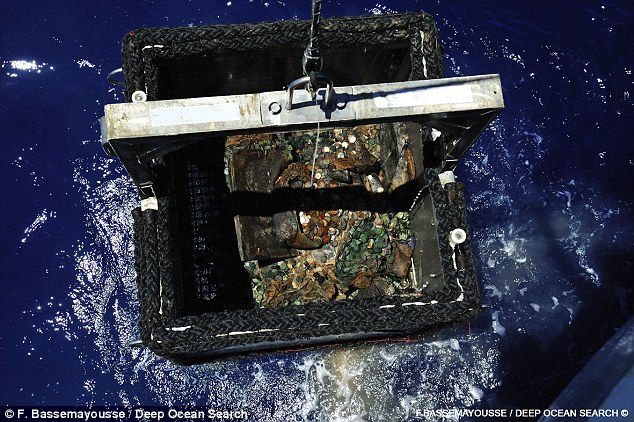A hoard of silver coins worth £34million that was sunk by the Nazis on board a steamship has been salvaged by a British-led team at a record depth of 5,150m (17,000ft).
The SS City of Cairo was travelling from Bombay to England in 1942 when it was torpedoed by a U-boat 480 miles south of St Helena, taking 100 tons of rupees with it to the bottom of the ocean.
It was long assumed that the vessel's cargo, belonging to the UK Treasury, would be lost forever such was the complexity of the task facing salvage experts.
That was until a team led by British expert John Kingsford used pioneering techniques to track down the ship with powerful sonar and robotics.
Underwater company Deep Ocean Search (DOS), which included 20 French oceanographers, was then contracted by the UK Ministry of Transport to recover the coins from a record depth of 17,000ft - some 4,500ft deeper than the Titanic.
A spokesman for DOS said: 'This was to be a difficult search as the water depth would exceed 5,000m, the weather, swell and currents were known to be challenging and the presumed site was some 1,000 miles from the nearest land in the foothills of the mid-Atlantic ridge.'
When the ship was finally discovered, it was 'broken in two and buried deep in the seafloor silt', adding that 'parts of the ship had metres of mud heaped upon it.'
Maeva Onda, one of the oceanographers on board the salvage ship, SV John Lethbridge, said the search submarine was successful on its first dive.
'After two hours of underwater descent, the robot transmitted the first images of the wreck. It was incredible,' she told Le Figaro, as cited by the Daily Telegraph.
The find was confirmed when the robot brought up coins stamped with the Crown.
But the team suffered 'serious' problems trying to recover the bulk of the hoard because of the depths involved.
The spokesman for DOS said: 'The team quickly found that operating at this depth caused serious technical difficulties which were new to us and which had to be resolved, quickly.
'The combination of pressure, temperature, repeated dives at this depth and other issues resulted in multiple breakdowns of systems such as we had not experienced before when working in 3000m to 4000m depths.'
The recovery took place in 2013, but has only now been made public.
DOS has left a plaque commemorating their find on the sea bed.
(dailymail.co.uk)
ANN.Az







www.ann.az
Follow us !











